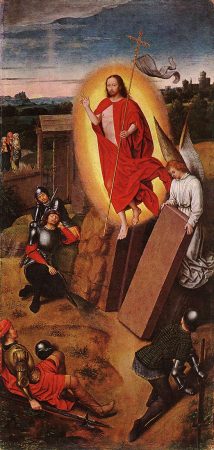by ProfDave, ©2022

(Apr. 19, 2022) — We all have to die, whether we face it or whether we back into it. We have no right to be surprised. No one gets out of this world alive. Is death a hideous monster, the grim reaper, or the liveried doorman at the entrance to your luxury hotel or gated community? Down through history mankind has grappled with this consciousness and, with various degrees of confidence, imagined a life beyond death. Burial rituals of every race of intelligent hominids presumed an afterlife. Just what that life was like – sleeping with your fathers? wandering the earth as a disembodied spirit? some form of reincarnation in endless cycles? absorption into the All? gehenna or paradise? – was vague and conditional on the state of your conscience and the record of your deeds.
The events we celebrated this past weekend changed the face of death for millions of Christians in every century and every nation. In the face of death, we see the front door of home – and the face of the dear Savior. In the crucifixion of Jesus – if He was who He said He was – the barriers between man and God were breached. A perfect man and a holy God took on Himself the penalties of all mankind’s misdeeds, a consummate fusion of both the love of God and the justice of God. If He was who He said He was. How do Christians know that?
On the third day, according to the ancient scriptures and His own repeated prediction, He burst the bonds of death and hell. For Christians Resurrection Day, beyond all question, validated the divinity of Christ and the authority with which He taught about death, heaven and hell (among other things). Surely, only God could raise the dead and surely He would not raise a blaspheming imposter.
“It is appointed unto man once to die and after death the judgment” (Hebrews 9:27). As many peoples believed, the judgment would separate “the sheep from the goats,” as Jesus put it, according to their deeds. There are “none righteous, no not one” – we are all goats. But Jesus opened for us a way to be His sheep – He is “the way, the truth and the life.” I will face the Judge of all the earth with Jesus at my side. I am His and He is mine! My eternal future is not in my perfection, but in my relationship with Him.
The problem with death is that it brings us face to face with God. “To die, to sleep, perchance to dream? Aye, there’s the rub!” says Shakespeare’s Hamlet. Hamlet, an unhappy pagan, would be dumped out into a menacing unknown, naked to anything that lurked in his conscience or nightmares. Whatever you say you don’t believe, you don’t want to die with regrets, doubts, or a guilty conscience. If you have spent your life thus far avoiding, ignoring, or defying God, you certainly do not want to encounter Him in a narrow place, much less live with Him. However, if you are in love with Him, talking with Him on a daily basis, depending on Him in your weakness, you may still be a little nervous, but you look forward to that encounter as a bride looks forward to coming down the aisle. “Perfect love casts our fear.”
“’O Death, where is your sting? O Hades, where is your victory [Hosea 13:14]?’ The sting of death is sin, and the strength of sin is the law [legalism]. But thanks be to God, who gives us the victory through our Lord Jesus Christ (I Corinthians 15:55-57).”
Why me? I am no better than anyone else. Whatever innocence I have is due to a lack of opportunity or of courage to do what I secretly wanted to do. Actually, everyone has the same opportunity. “He came unto His own and His own received Him not, but to as many as received Him, to them gave He authority to become children of God” (John 1:11-12). I tried for decades to qualify myself by my own righteousness. Jesus said, “Come unto me all you who are weary and heavy laden, and I will give you rest” (Matthew 11:28). I came. I admitted I could not carry the load. Jesus paid my penalty on the cross. He forgave me. He is changing me in ways I never could change on my own. He gives me rest. I am a grateful child of God. I look forward to seeing Him face to face. How about you?
David W. Heughins (“ProfDave”) is Adjunct Professor of History at Nazarene Bible College. He holds a BA from Eastern Nazarene College and a PhD in history from the University of Minnesota. He is the author of Holiness in 12 Steps (2020). He is a Vietnam veteran and is retired, living with his daughter and three grandchildren in Connecticut.

